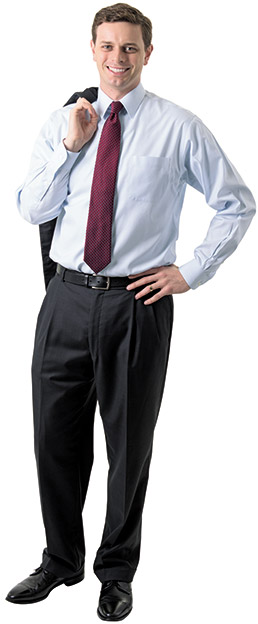Subscriber Benefit
As a subscriber you can listen to articles at work, in the car, or while you work out. Subscribe NowDespite Ronan Johnson’s demanding schedule as a corporate attorney, he makes a point to invest substantial time in supporting community organizations. He’s closed more than 25 merger-and-acquisition transactions totaling more than $1 billion and worked on two transactions considered “deals of the year” by the Association for Corporate Growth. He’s very active within the Indianapolis Bar Association and created the “Intro to Indy” series in 2014 to help younger attorneys find ways to get involved in the city. Ronan moved to Indianapolis in 2011 and understood the benefit of connecting professionals to opportunities with local organizations. He also volunteers with several nonprofits, including Meals on Wheels and the United Way of Central Indiana.
 (IL photo/Eric Learned)
(IL photo/Eric Learned)What are some work/life balance tips?
Be protective of your time and very honest with yourself about how much time you actually have to commit to endeavors outside of work and family. Don’t be afraid to say no to opportunities if you aren’t passionate about them or don’t realistically have the time necessary to excel at them. One, and one’s reputation, would be better served not getting involved in anything rather than getting involved and doing a poor job.
Why is it important for attorneys to be involved in their local bar association?
Bar association involvement is a great way to meet attorneys outside of your practice area and firm that you otherwise probably wouldn’t cross paths with. For younger attorneys, bar associations and their committees are great avenues to get involved early in their career and start to create a positive reputation by helping put on events and educational programming.
If you couldn’t be a lawyer, what would you do for a living?
A much younger version of me would say a fighter pilot, but realistically I would be a business consultant (not nearly as sexy, but much more within my skill set and abilities).
What excites you about your practice?
I get to use a lot more of my prior business experience than I anticipated. Clients of course want to know the legal ramifications of their actions, but like the law, business decisions aren’t always black and white and certain decisions that make sense from a legal standpoint might be horrible for a client’s business. As a result, I frequently get the opportunity to serve clients as both a corporate attorney and a business consultant, finding the best solution for their business that also makes sense from a legal standpoint.
What do you like the most about being an attorney? What do you like least?
Most: The projects I work on are intellectually stimulating and challenging on a consistent basis.
Least: Some clients view legal services as merely a cost center and try to minimize the scope of engagements or bring us in at the last possible moment. While some other practice areas may be cost centers, in my practice we often can add significant value (or minimize the potential for future loss) if we are brought into a transaction early enough.
What is the most important lesson you learned from your mentor?
To be able to most effectively help a client achieve their goals you need to be able to see the big picture of not only the business points, goals and motivation of the specific transaction at hand, but also understand how the transaction fits into the larger picture of the client’s business and life. Keeping this big picture in mind allows me to act as a project manager in transactions and appropriately prioritize all aspects of transactions to ensure that a client’s goals are met and that I can exceed their expectations on a consistent basis.
What’s one major lesson you learned from participating in the IndyBar Bar Leader Series?
As part of the series, we did a large community service project. It was amazing to see how many great organizations and resources there are around town that were excited to collaborate with us and help make a positive impact on the community we were trying to help.
What’s something about you not many people know?
I lived in Bandung, Indonesia, for two years (7th and 8th grade).
Where do you see yourself in 20 years?
Happily married to my beautiful wife Beth, with our twins in college and a couple kids in high school. From a work perspective, I see myself as a partner at Taft with a robust corporate and transactional practice that helps numerous long-term clients who view me as a trusted business adviser.
What will the legal profession look like in 15 years?
I think the legal profession as a whole will be smaller than it is today and will become even more client-focused and customer-service driven. Practices that are the most successful will be run like businesses and offer services to clients in a more efficient manner that are centered on the client’s needs and exceeding their expectations.
What is one misconception people tend to have about what you do for a living?
That lawyers are litigious and argumentative. Granted, there are situations that call for intense negotiating, but the way I can best serve a client is to listen and understand what their goals and motivations are and then work collaboratively and efficiently with opposing counsel to find solutions that achieve both of our clients’ core goals.
Please enable JavaScript to view this content.
